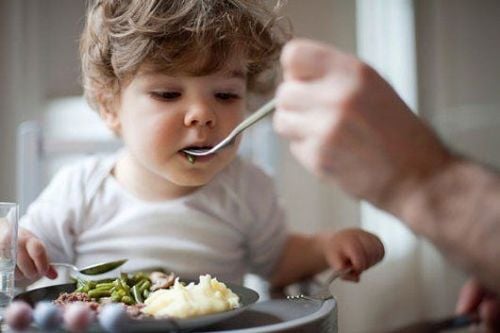This is an automatically translated article.
The article was professionally consulted by Master, Doctor Doan Ngoc Quynh Tram - Department of Pediatrics - Neonatology - Vinmec Nha Trang International General Hospital.19-month-old baby is the age when the baby is very cute, can talk and run around the house. Your baby's sleep is also gradually becoming more stable. At this time, mothers need to pay attention to games that stimulate the child's brain development as well as ensure nutrition for children.
1. Sleep in a 19-month-old baby
A 19-month-old baby will need about 13.5 hours of sleep a day, with 11.5 hours of nighttime sleep and 1 to 2 hours of afternoon naps. You should establish a routine for your baby to go to bed between 7 and 8 pm.You also may not necessarily follow this rule - put your child to bed before 8pm. You can do whatever feels good for you and your little one. But keep in mind that if your child runs around, and plays a lot in the evening, that doesn't mean he's not tired. This can be quite the opposite, as excessive fatigue can lead to the release of adrenaline and give the child a lot of energy, and the child will continue to run and jump. If you notice that your child is finding it difficult to wake up in the morning, is very tired during the day, or is falling asleep a lot, it's a sign that he's not getting enough sleep.

Trẻ 19 tháng tuổi sẽ cần ngủ khoảng 13.5 giờ một ngày
2. Nutritional care for 19-month-old children
According to the standards of the World Health Organization, the average height and weight of a 19-month-old baby is:19-month-old girls: The average height needs to be 81.7cm. The average weight reached 10.4 kg. 19-month-old boys: The average height should reach 83.2cm. Average weight reached 11.1 kg. For healthy growth, you need to continue to feed your baby three meals a day, two snacks and 400ml of full-fat milk - don't forget that your baby's daily milk intake can be less than 400ml if you're still breastfeeding.
Breastfeeding is good for baby's health. The World Health Organization recommends that all children be breastfed until they are 2 years old or longer.
You also need to be aware that if your baby is still bottle-fed, he or she can develop tooth decay. At this age, babies are already able to use cups proficiently, so don't give them a bottle. You should get in the habit of taking your child for a regular dental check-up every 6 months and if you discover brown patches on your child's teeth you should take your child to the dentist, as it could be a sign of gum disease. dental caries. In addition, mothers should also pay attention to nutrition for children according to each age.
3. Development in a 19-month-old baby
3.1 Moving
Your 19-month-old can already run around and is pretty fast, so keep a close eye on them! Children will love to get out of your arms and run away. The large open spaces such as in supermarkets, hotel lobby .... will be great places for children to run and jump.Sometimes children feel so excited to run and jump freely that they refuse to let you lead. Therefore, when taking children out on the street or in crowded places, mothers need to pay special attention to the children, do not let them run into crowds of people and lose them.
3.2 Senses, communication and emotions in 19-month-old infants
Your 19-month-old can say a few basic words, happily conversing with you or others with words that may not be clear, simply learning to speak.At this time the child will develop the ability to play, play and the child will enjoy feeding games with dolls or stuffed animals. Children will also know what some basic objects are, such as cups, chairs, tables and phones... without necessarily being able to say the words.
4. Activities and games to help your 19-month-old baby develop
Encourage language development in your child by interacting, talking to him or giving him a toy phone to talk to.Children also begin to be toilet conscious at this stage and can tell you whether they are going "heavy" or "light". Toilet training usually doesn't begin until your child is 2 years old, but you can teach it slowly by showing your child how you go to the toilet and flush. This gets them used to using the toilet and shows there's nothing to be afraid of.

Khuyến khích sự phát triển ngôn ngữ ở trẻ bằng cách tương tác với trẻ
5. Milestones for a 19-month-old baby
Can point to one or two body parts, like head and belly, as per your request. Can turn the pages of a hardcover book. Look at you when something happens - like when someone screams - to see how you react. Remember that children will always imitate you, so they will get nervous if you are nervous, and will learn to stay calm if you are calm. Your child may also:Babble in some way, even if it seems meaningless to you. Resist shampooing. Babies are beginning to assert themselves, so they may not enjoy it because shampoo often stings their eyes, and water can get into their ears and nose. There are unwarranted tantrums. Run away and find a way out of your loving arms. The 19-month-old period is extremely important for a child's development. If the child is not taken care of carefully, it is easy to suffer from nutritional diseases such as (rickets, malnutrition, growth retardation). If they notice unusual signs in their child, parents should take their child to a reputable medical facility for advice and examination. The Pediatrics Department at Vinmec International General Hospital has strengths in examination - detection - early intervention for:
Pediatric psychology: Speech delay - psychological disorders Intensive kidney disease: Kidney failure , nephritis, lupus erythematosus, urinary malformations, bed-wetting Intensive endocrine pathology: Precocious puberty, diabetes, growth retardation, thyroid disease, bed-wetting Comprehensive nutritional advice for all subject. A 19-month-old baby needs 5mg of elemental zinc/day to eat well, reach the correct height and weight and exceed the standard. Zinc plays a role in affecting most biological processes taking place in the body, especially the breakdown of nucleic acids, proteins... Organs in the body when zinc deficiency can lead to a There are a number of diseases such as neurological disorders, irritability, etc. Therefore, parents need to learn about the role of zinc and guide them to appropriate zinc supplements for their children.
In addition to zinc, parents also need to supplement their children with other important vitamins and minerals such as lysine, chromium, B vitamins,... errands.
Please regularly visit Vinmec.com website and update useful information to take care of your baby and family.
Reference source: emmasdiary.co.uk














